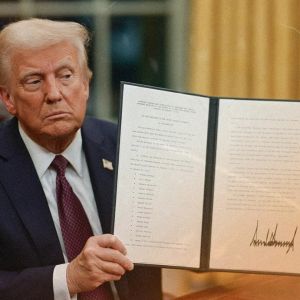
U.S. President Donald Trump has hinted that he is willing to take a softer stance on tariffs on vehicles assembled in North America. This decision was made in response to the recent actions of the U.S. president to impose a 25% tariff on cars and parts imported to the country. Trump said in the Oval Office that his administration is “looking at something to help car companies” as they adjust their operations. Car companies have relocated sourcing to Canada, Mexico, and other countries, and they may be given more time to relocate production back to the United States. USMCA rules offer partial protection from Trump tariffs With reference to the USMCA trade agreement, automobiles, and automotive parts manufactured in Canada and Mexico are partially protected from the new tariffs. It is imperative to note that the 25% levy only applies to non-United States content if the vehicles meet the agreement’s rules of origin. This decision could be related to increasing concerns within the White House that some of the tariffs may adversely affect local manufacturers rather than help them. Shares of Ford, General Motors, and Stellantis rose after Trump’s remarks. General Motors Company and Ford Motor Company increased by nearly 4%, while Stellantis jumped by 5% in the U.S. trading session. The Detroit 3 have repeatedly called on the White House to exclude automobiles and parts to meet USMCA from tariffs. According to Matt Blunt, th e Am erican Automotive Policy Council president, existing tariffs present some social costs to manufacturing. He pointed out that the current tariffs on steel, aluminum, and car parts hamper the ability to assemble automobiles in the country. “I think there is a growing awareness that some of these parts tariffs are having unintended consequences and make it more difficult to assemble vehicles in the United States.” ~ Matt Blunt. Donald Trump has imposed a 25% tariff on steel and aluminum and a 20% tariff on goods from China, which is an additional pressure on the automotive industry. Blunt reiterated that although the administration’s objective is to support manufacturing in the US, towering tariffs on critical components may disrupt the objective. Tech industry secures critical exemptions While carmakers will have to wait for clarity, the technology sector has been given some breathing moment. The Trump administration has spared smartphones, laptops, semiconductors, and other electronics from the massive tariffs on imports from China. US Customs Border Patrol later established that these exceptions hold from April 5. The exceptions cover products that were undergoing the 10% tariff across the globe as well as the 125% tariff on goods sourced from China. The decision has been widely categorized by delegates as a game changer for a number of tech firms because they will be shielded from public pressure of pricing down consumer devices. Wedbush Securities analyst Dan Ives called the tariff reprieve ‘a dream scenario’ and said it benefits clients with a focus on technology giants such as Apple, Nvidia, and Microsoft. The move is timely as more and more Silicon Valley firms step up attempts to diversify production from China. Apple, for instance, produces about 80% of its iPhones for the U.S. market in China. The remaining 20% comes from India. Trump’s tariffs had triggered worries that the price of the iPhone could soar significantly. Some projections estimated that the iPhone’s cost in the U.S. would triple if it were to pass the costs to consumers. The White House stated that the exemptions are temporary and allow companies to move their manufacturing lines to the States or any other nation of their choice, such as India or Vietnam. White House press secretary Karoline Leavitt said that Trump’s objective has been doubled to minimize purchasing goods from China. However, tariffs on technology products have been slightly eased, but Trump has not been very friendly towards China. The new measures also consist of a 145% tariff on Chinese imports, while other countries that have not responded to U.S. tariffs face a 10% across-the-board tariff up to July. Cryptopolitan Academy: Coming Soon - A New Way to Earn Passive Income with DeFi in 2025. Learn More


